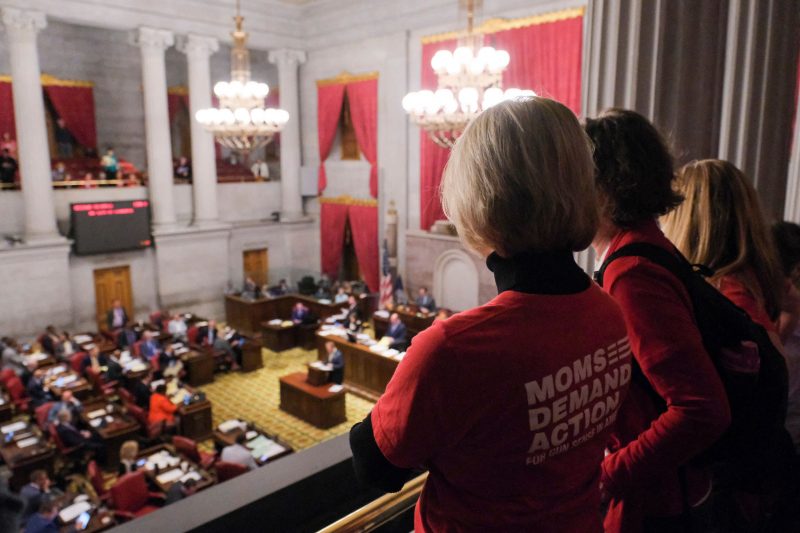NASHVILLE — Two dozen people sat silently in the visitors’ gallery overlooking the Tennessee Capitol of Representatives, holding signs that said, “Our children are watching you.”
They were furious about a Nashville school shooting three weeks earlier in which a former student carrying an AR-15 assault-style rifle and other guns killed six people, including three 9-year-olds.
Protests since then had been nearly nonstop, and polls showed that a large majority of people across this Republican-controlled state supported at least some new restrictions on guns.
Democratic lawmakers were demanding action. But on the House floor, Republicans wanted to talk about Hungary.
Republican Rep. Tim Hicks offered a resolution “commending” the Danube Institute, a think tank based in Budapest. That group has close ties to the government of Viktor Orban, Hungary’s far-right autocratic leader, who is a favorite of former president Donald Trump and admired by many U.S. conservatives.
While the European Parliament has said that Hungary under Orban can “no longer be considered a full democracy,” Hicks praised the Danube Institute for its “focus on Christian faith and democracy” and its research into “persecuted Christians.”
In the final days of the 2023 session last month, Tennessee’s GOP-controlled state legislature ignored growing public calls — even from fellow Republicans — to address gun violence.
Instead, it passed a measure to allow teachers to refer to students by “he” or “she” even if the child prefers a different pronoun. It banned requirements for “implicit bias training” that raises awareness of unfair racial and ethnic stereotypes. It approved a bill protecting Tennessee property owners against U.N. sustainability goals, elevating a right-wing conspiracy theory.
Tennessee is one of an increasing number of states (19 Republican, 9 Democratic) where one party has a “supermajority,” such a lopsided advantage that it can override a governor’s veto without relying on votes from the other party. In 2020, only 22 states had supermajorities.
Of Tennessee’s 131 state legislators, 101 are Republicans, as are the governor, both U.S. senators and 8 of the 9 members of the U.S. House of Representatives.
But here, as in other states with one-party dominance where representation has been skewed through partisan gerrymandering, the almost-absolute nature of Republican control doesn’t fully reflect the will of Tennessee voters. That means there is often a disconnect between what the public wants and what the legislature does.
“The state is conservative, but not as conservative as the state legislature would lead you to believe,” said John G. Geer of Vanderbilt University in Nashville, who has been polling on state attitudes for more than a decade.
Geer’s most recent poll, in early May, found strong majorities of Tennessee voters — Democratic and Republican, urban and rural — support new gun safety measures, including stricter requirements for gun storage and waiting periods to buy them. Even among those who self-identified as MAGA Republicans, 72 percent supported tighter background checks.
“Tennesseans are clearly in support of some gun reforms,” Geer said.
Republican Gov. Bill Lee softened his views after the school shooting, in which two of those killed were close friends of his wife. Lee signed an executive order tightening the state’s background check laws for gun purchases. He also called for a new law denying guns to people determined by a judge to be a potential threat to themselves or others — a “red-flag law” of the sort that was backed by nearly three-quarters of Tennessee voters in the Vanderbilt poll.
Senate Democrats rallied around Lee’s proposal. But Republican state senators voted against even discussing it.
Instead, there was movement in the other direction, toward protections for gunmakers. On the same day that thousands of people calling for gun control locked arms in a three-mile human chain that ended at the state capitol, the state Senate voted to increase gun manufacturers’ liability protections.
Republicans in the House, meanwhile, made national headlines by expelling two young Black Democrats, Justin Pearson and Justin Jones, for taking over a House session with a bullhorn and demanding stricter gun laws. Gloria Johnson, a White Democrat who had joined their protest, was not expelled.
The Republican lock on Tennessee politics is relatively new. The Democratic Party largely ran the state from the end of the Civil War until 1970 and then power alternated between the parties for the next four decades.
But many Democrats lost their seats in the tea party wave of 2010, and Republicans took solid control. Republicans say they dominate the state because they better represent the views of Tennessee voters. But they also have used their majority to gerrymander districts, redrawing them so one party is nearly guaranteed to win.
The Princeton Gerrymandering Project, which studies the issue nationally, said that after last year’s round of redistricting, only 7 of the Tennessee House’s 99 districts are competitive. Not a single one of the 33 state Senate seats is rated competitive.
That means when it comes to Tennessee’s legislative elections, winning the primary is often the only race that matters, with candidates playing to their base and rarely feeling pressure to listen to independents or compromise across the aisle.
Democratic voters are concentrated in a relatively small number of districts representing urban areas. Nineteen of the 24 Democrats in the House are from greater Nashville and Memphis, the state’s two largest cities. In a state where Joe Biden won 37 percent of the vote in 2020, the state legislature is just 23 percent Democratic.
Republican Beth Harwell, who became Speaker of the state House after the 2010 elections and held the job for eight years, said candidates from both parties often “just want to say the most extreme thing so that they have a sound bite on either CNN or Fox.”
Harwell, who now runs a national program that encourages listening to those in the minority, said parties with supermajorities “can become lazy.”
She said she recently watched debates in the Tennessee House and “felt like my Republicans were not adequately prepared for debate, because they knew they were going to win no matter what they said. And that’s not a good thing.”
During the final week of this year’s regular session, there was little true debate. Hour after hour, a GOP legislator would offer a bill and allow a few Democrats to argue against it. Then Republicans would abruptly force a vote. The outcome was never in doubt, and efforts by Democrats to steer the conversation to gun control were quickly shut down.
All of which led the House to Hungary.
“It’s been interesting to read about the Hungarian way of life,” said Hicks, a building contractor from eastern Tennessee.
The Tennessee legislature is a part-time job for its members, who meet for up to 90 session days over two years, mainly from January to April or May. They are paid $24,316 a year, plus a per-diem during the session.
The average age of Tennessee legislators is 57, and just six are 35 or younger, according to the Eagleton Institute of Politics at Rutgers University. Many of the legislators are retired or have other jobs — small business owner, funeral director, real estate agent, insurance broker, farmer, nurse, police officer, teacher, surgeon, lawyer, auctioneer.
Hicks said that in Hungary: “There’s very little problems with issues like addiction, mental health, homelessness, crime and welfare. And welfare: if you are able, then you work. I believe this stems from their belief and living by Christian faith.”
Jones, 27 and newly reinstated by local authorities following his ouster, rose in the chamber to tell Hicks he was “deeply troubled” by the bill.
“This organization is tied to an autocrat in Hungary — Orban,” Jones said. “Are you familiar with who that is?”
“No, I’m not,” Hicks said.
Jones looked stunned.
“This is an organization that has been allied with fascist governments,” Jones said, his voice rising.
Hicks, undeterred, said Tennessee should follow Hungary’s example of solving problems through faith instead of politics.
“If you believe that to be true, Representative Hicks, perhaps it’s time to switch professions,” Jones said. “Because we’re here as a government body to promote the public good. If you want to go to theology school, I see some folks from Vanderbilt Divinity here who you can ask about —”
Speaker Cameron Sexton smacked his wooden gavel.
“Representative Jones, you’re out of order. That’s enough. We’re moving on.”
Sexton then called on a Republican representative, who stood and said, “I move the previous question,” a maneuver that ends debate and calls for a vote.
Democrats yelled “objection!”
The bill passed 70 to 20.
In the afternoon, the House took up the state’s $56.2 billion budget for the coming year. Republican Rep. Patsy Hazlewood presented the budget bill, which included everything from small business tax cuts to teacher pay raises.
Democratic Rep. Jason Powell, a Nashville real estate broker, proposed amending the budget to include Medicaid expansion.
Tennessee is one of ten states, all controlled by Republicans, that have refused millions in federal health coverage for low-income adults offered through the Affordable Care Act, also known as Obamacare.
Expanding Medicaid stands virtually no chance of passage against the Republican supermajority. But Powell tried anyway, arguing that it would help those harmed by gun violence.
He told his colleagues that “gun violence injuries cost victims and their families more than $1 billion each year” and that guns are now the leading cause of death for Tennessee children. He said Medicaid expansion would help shooting victims with lifelong disabilities and medical bills.
No Republican members spoke on Powell’s proposal, but one called the vote.
It failed 74 to 24, along party lines.
The budget didn’t mention gun-law reforms, but it contained $140 million to hire an armed security officer in every public school and $7 million for officers in private schools.
“That’s not what Tennesseans are asking for,” Jones said. “They’re asking for meaningful gun legislation.”
Several protesters in the House gallery whooped in agreement.
“I’ll put this budget up against any budget in any state in this country,” Hazlewood said. “Tennessee leads the way. We are fiscally responsible. We are giving money back to our citizens in a fiscally responsible way.”
The budget passed 94-5.
Thursday morning’s House session started with Nashville country music legend Steve Earle singing his rock anthem, “Copperhead Road,” which Lee has made an official state song in Tennessee.
When he finished, Earle said he hoped lawmakers would also listen to his song, “The Devil’s Right Hand,” which describes the dangers of guns. The reference seemed to mainly escape the lawmakers, who crowded around for a photo with Earle.
After the Pledge of Allegiance, the House breezed through a long list of noncontroversial bills that mainly passed unanimously. No one mentioned guns.
When the afternoon session began after lunch, GOP Rep. Ed Butler, who runs a company that installs fire sprinkler systems, offered a bill creating a new “Tennessee monuments and memorials commission.”
Jones slammed the bill as “an insult to Tennesseans.”
He said it was designed to reverse a 2021 decision to remove from the capitol rotunda a bust of Nathan Bedford Forrest, a Confederate general, slave trader and the first Grand Wizard of the Ku Klux Klan.
The Tennessee legislature is 13 percent Black, compared to 17 percent of the state population. Sixty percent of the Democrats in the legislature are Black. There are zero Black Republican legislators.
“Let’s not continue to protect Confederate monuments more than we do protect the lives of Tennesseans,” Jones told his colleagues, referring to the House’s failure to consider gun legislation.
Butler replied: “Whether you like our history or not, it is our history.”
Another Republican moved the question. Democrats objected. The bill to create the commission passed along party lines.
Republicans next proposed a bill to give the state more control of revenues from the Music City Center, Nashville’s highly successful convention center. Democrats smelled political payback for the city’s decision last year to decline to host the 2024 Republican National Convention.
Republicans in the legislature have increased state influence in the governance of Nashville, the country music hub often called Music City USA, which is a tourism and business juggernaut that contributes about a third of the state’s GDP.
“Nashville has become a kind of a stand-in for Fox News-style targeting: it’s diverse, it’s Democratic, it has crime,” Nashville Mayor John Cooper said in an interview. “It’s easy to create a boogeyman. It’s very popular with their base.”
On the floor, Democratic Rep. Bill Beck of Nashville, said: “So we’re doing what we should do and being a success. And now the state says, ‘Oh no … we want to squash the entrepreneurial spirit of your city and take your money.’”
Republicans cut off debate and passed the bill.
On Friday morning, the last day of the session, a dozen gun-control protesters sat in the House gallery holding signs that said, “We are not going away.”
On the floor, Republicans began discussing Agenda 21, an obscure U.N. program that encourages sustainable development worldwide. It has long spawned unfounded conspiracy theories on the right about the United Nations taking control of U.S. life.
Republican Rep. Dennis Powers proposed a bill that would prohibit private property rights from being infringed upon by Agenda 21 or any other U.N. measure. “We do not want the United Nations to control anything that we’re doing in United States by international law,” said Powers, an insurance agent from eastern Tennessee.
Democratic Rep. John Ray Clemmons, a Nashville attorney, pointed out that U.N. recommendations do not supersede the U.S. Constitution, “So I guess I’m a little confused here.”
Jones argued that everyone should support U.N. goals on sustainable development and climate change.
Powers responded: “Climate change is just a way of redistribution of wealth; there is no climate change.”
The bill passed 66 to 22.
Next up: warning signs at polling places.
Republican Rep. Tim Rudd spoke in favor of a bill that would require polling places to post bright yellow signs warning voters that it is a crime to vote in a party’s political primary without being “a bona fide member or affiliated with” that party.
Rudd explained that Tennessee voters were increasingly doing that and that they should be warned that it was a felony.
“It just seems like we’re trying to intimidate voters,” said Freeman, the Nashville Democrat, who said the signs could easily scare away well-intentioned voters.
Rudd said Tennessee had “the most secure election process in the entire nation” and it was “open and fair.” He said the warning signs would not intimidate anyone.
“Tennessee has one of the lowest voter turnouts of any state in the country because of the voter intimidation and suppression tactics of the state of Tennessee,” Clemmons responded.
A Republican moved the question. Debate ended. The bill passed.
After lunch, the House began the last few hours of its regular 2023 session debating a bill about pronouns.
Republican Rep. Mark Cochran offered a bill that “allows a teacher to refer to a student by pronouns based on the student’s birth sex without fear of adverse disciplinary or legal action.”
Cochran explained that the bill “protects a teacher’s right not to speak, if doing so violates their right of conscience.”
Jones said the proposal was the 27th “anti-LGBTQ” bill the House had considered this year. The legislature had already passed a ban on gender-affirming health care for transgender youth and a ban on drag shows in public places.
“This is not what the teachers in my district are asking for,” Jones said. “They’re asking for safer schools and common-sense gun laws.”
Republican Rep. Rusty Grills, a farmer, rose to quote Scripture:
“Ezekiel Chapter 22, Verse 23, refers to standing in the gap. And that’s exactly where I believe Tennessee is right now. We are standing in the gap between that which is right and that which is destructive. And legislation like this that protects individual rights, honors God, promotes a Christian worldview, is why Tennessee is growing economically and by population. And anytime the legislature can position ourselves for the teachings of Christ, it’s a good day.”
After more than 40 minutes of debate, Republicans called for a vote.
The pronouns bill passed 72 to 22.
Tempers were running high when Republican Rep. Jason Zachary proposed the next bill, to prohibit requiring public school teachers or other employees to undergo “implicit bias training.”
Zachary said teachers in his district had complained that they had undergone training where they were told “white males were born as oppressors” and the Southern Baptist faith was “steeped in racism.”
Zachary, who is White, said teachers should not be subjected to training that says they are biased or have “racist tendencies” simply because of their skin color.
Jones said the majority of Tennessee students facing disciplinary action are children of color and students with disabilities. He said the training would help teachers “not automatically see students of color as threats.”
Pearson — who, like Jones, had also been reinstated by local officials — stood to pick up where Jones left off, speaking about “white supremacy” and “patriarchy.”
As he spoke, Zachary began talking with another Republican member in the front of the room, known as the well, clearly not listening to Pearson.
“Only when a member like myself is speaking is the person at the well interrupted by another member,” Pearson said. “This body has its biases about who deserves respect, based on our race, based on our age, based on where we come from, based on our party.”
Zachary returned to the microphone.
“Respect is earned in this body. And when respect is given, it is reciprocated,” he said.
Republicans ended the debate. The bill passed with 71 Republican votes.
There were no more items on the legislative agenda.
All the bills the House Republicans had approved had also passed the Senate and were headed to the governor’s desk, where they would become law.
Sexton adjourned the House until next January with a sharp smack of his gavel. Two weeks later, Lee announced that he was calling the legislature back on Aug. 21 for a special session on “public safety.”
His office issued a statement citing “broad agreement” about the need for “thoughtful, practical measures that strengthen the safety of Tennesseans, preserve Second Amendment rights, prioritize due process protections, support law enforcement and address mental health.”
It did not mention the word guns.








